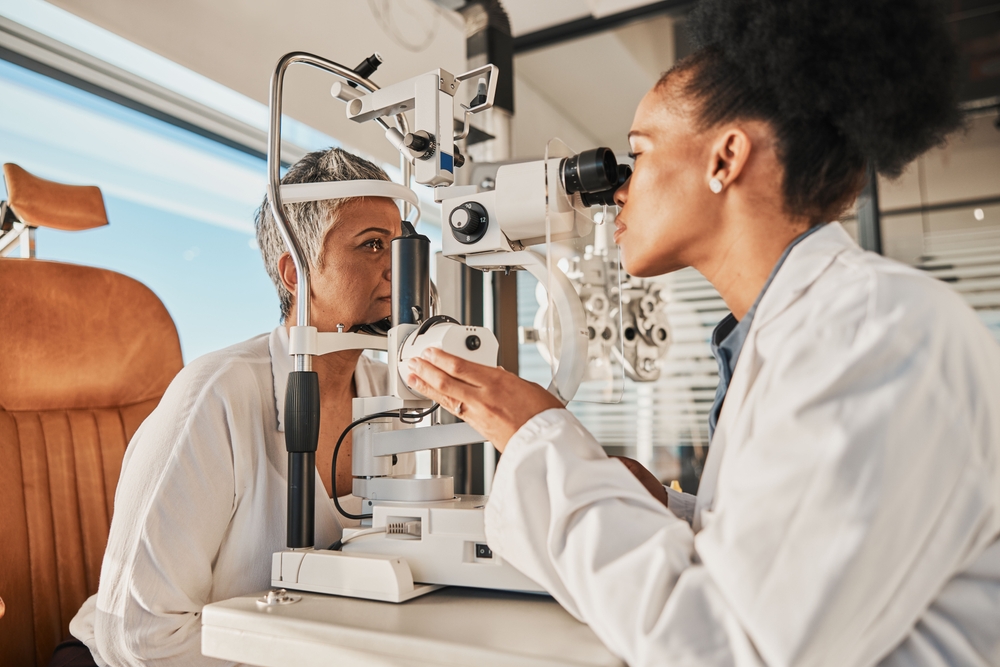
With terms like ophthalmologist, optometrist, and eye doctor being used interchangeably, many patients wonder which type of eye doctor is best suited for their needs. At Metro Eye Care, the comprehensive team of both ophthalmologists and optometrists works together to provide complete eye care services, from routine vision screenings to complex surgical procedures.
Keep reading to learn more about the distinct roles, training levels, and capabilities of each eye care professional to empower you to make informed decisions about your vision health.
What is an Ophthalmologist?
Ophthalmologists are medical doctors who have completed extensive medical education. Their training includes four years of undergraduate education, four years of medical school earning either an M.D. or D.O. degree, and at least four additional years of specialized ophthalmology residency training.
This means ophthalmologists complete a minimum of 12-14 years of higher education and medical training. Many ophthalmologists, like those at Metro Eye Care, pursue additional subspecialty fellowship training.
Dr. Patrick Higgins completed dual fellowships in medical and surgical retina, while Dr. James Kirszrot underwent specialized training in oculofacial plastic and reconstructive surgery at Harvard Medical School.
What is an Optometrist?
Optometrists complete four years of undergraduate education followed by four years of optometry school, earning a Doctor of Optometry (OD) degree. While optometrists are often referred to as “eye doctors,” they are not medical doctors.
Their education spans approximately eight years, with a focus specifically on vision care, eye health, and the diagnosis of certain eye conditions. Both Dr. Thomas LoPresti and Dr. James Cindrario at Metro Eye Care bring over two decades of optometric experience, having completed specialized externships and continuing education to enhance their clinical skills.
What Can Ophthalmologists Treat?
Ophthalmologists can diagnose and treat all eye diseases, perform surgical procedures, prescribe medications, and provide comprehensive medical eye care. They are the only eye care professionals qualified to perform surgery, including cataract surgery, glaucoma procedures, retinal surgeries, and cosmetic eyelid procedures.
Metro Eye Care’s ophthalmologists specialize in various subspecialties. Dr. Scott Pomerantz performs advanced cataract surgery using the Catalys Femto laser and specializes in multifocal intraocular lens implants, while Dr. Sejal Patel focuses on glaucoma management and minimally invasive glaucoma surgeries.
What Can Optometrists Treat?
Optometrists provide primary vision care, including comprehensive eye exams, vision testing, and the prescription of glasses and contact lenses. They can diagnose and manage certain eye conditions, prescribe some medications for specific eye diseases, and provide pre- and post-operative care in collaboration with ophthalmologists.
The Metro Eye Care optometry team excels in specialty contact lens fitting, including multifocal lenses, toric lenses for astigmatism, and complex fits for conditions such as keratoconus. They also manage routine eye conditions, provide urgent care for eye injuries and infections, and monitor patients with chronic conditions, such as glaucoma, under an ophthalmologist’s supervision.
When Should You See an Ophthalmologist?
You should see an ophthalmologist if you need medical or surgical treatment for cataracts, glaucoma, or retinal conditions. Metro Eye Care’s retina specialists, Dr. Higgins and Dr. Angioletti, have extensive experience in clinical research and advanced treatment protocols.
Ophthalmologists can even perform cosmetic or reconstructive eyelid surgery. Dr. Kirszrot specializes in both medical and cosmetic oculoplastic procedures, from ptosis repair to aesthetic blepharoplasty.
When Should You See an Optometrist?
Optometrists perform routine eye exams and vision screenings. Regular comprehensive eye exams can detect problems early, even before symptoms develop.
You should also see an optometrist if you require eyeglass or contact lens prescriptions, especially for challenging fits or specialty lenses. If you have minor eye irritation, dry eye symptoms, or need management of stable chronic conditions, they can help pinpoint the cause of your symptoms and provide relief.
Is it time for your next eye exam with an ophthalmologist or optometrist? Schedule your appointment at Metro Eye Care in Paramus, NJ, today!
